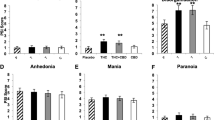Abstract
Rationale
Establishing whether cognitive changes follow long-term use of MDMA ("ecstasy") in humans has been difficult because of possible confounds with other drug use, particularly cannabis. Convincing evidence may be only obtained using experimental designs that account for such confounds.
Objective
In the present study, cognitive/behavioural measures were used to investigate whether long-term MDMA use or long-term cannabis use is responsible for the changes sometimes observed in recreational MDMA users.
Method
Tests of attention and memory were administered to subjects who used both MDMA and cannabis, cannabis only, or neither drug.
Results
The main finding was that cannabis users, whether or not they also used MDMA, showed significantly impaired memory function on word free-recall and on immediate and delayed story recall compared to non-users.
Conclusions
The findings highlight the importance of controlling for other drug use (particularly cannabis) when investigating persistent effects of MDMA in humans.

Similar content being viewed by others
References
Beck AT, Epstein N, Brown G, Steer RA (1988) An inventory for measuring clinical anxiety: psychometric properties. J Consult Clin Psychol 56:893–897
Block RI, Ghoneim MM (1993) Effects of chronic marijuana use on human cognition. Psychopharmacology 110:219–228
Cairns E, Cammock T (1978) Development of a more reliable version of the matching familiar figures test. Dev Psychol 13:555–560
Callow N (1996) Use of snowballing technique to investigate subjective mood and personality traits associated with ecstasy. Br Psychol Soc 5:49
Croft RJ, Mackay AJ, Mills ATD, Gruzelier JGH (2001) The relative contribution of ecstasy and cannabis to cognitive impairment. Psychopharmacology 153:373–379
Curran HV, Travill RA (1997) Mood and cognitive effects of 3,4-methylenedioxymethamphetamine (MDMA, "ecstasy"): weekend "high" followed by mid-week "low". Addiction 92:821–831
Dafters RI, Duffy F, O'Donnell PJ, Bouquet C (1999) Level of use of 3,4-methylenedioxymethamphetamine (MDMA or "ecstasy") in humans correlates with EEG power and coherence. Psychopharmacology 145:82–90
Davison D, Parrott AC (1997) Ecstasy in recreational users: self-reported psychological and physiological effects. Hum Psychopharmacol Clin Exp 12:91–97
Eysenck HJ, Eysenck SBG (1991a) The Eysenk Personality Questionaire—revised (short). Hodder & Stoughton, Kent, UK
Eysenck HJ, Eysenck SBG (1991b) The impulsiveness (IVE) questionnaire. Hodder & Stoughton, Kent, UK
Fischer CA, Hatzidimitriou G, Katz JL, Ricaurte GA (1995) Reorganization of ascending serotonin axon projections in animals previously exposed to the recreational drug 3,4-methylenedioxymethamphetamine. J Neurosci 15:5476–5485
Fletcher JM, Page B, Francis DJ, Copeland K, Naus MJ, Davis CM, Morris R, Krauskopf D, Satz P (1996) Cognitive correlates of long-term cannabis use in Costa Rica men. Arch Gen Psychiatry 53:1051–1057
Fox HC, Toplis AS, Turner JJD, Parrott AC (2001) Auditory verbal learning in drug-free ecstasy polydrug users. Clin Psychopharmacol 16:613–618
Goldberg D (1978) The general health questionaire. NFER-Nelson Publishing Co., Windsor, UK
Gouzoulis-Mayfrank E, Daumann J, Tuchtenhagen F, Pelz S, Becker S, Kunert S, Fimm H, Sass H (2000) Impaired cognitive performance in drug free users of recreational ecstasy (MDMA). J Neurol Neurosurg Psychiatry 68:719–725
Liechti ME, Vollenweider FX (2001) Which neuroreceptors mediate the subjective effects of MDMA in humans ? Hum Psychopharmacol Clin Exp 16:589–598
McCann U, Ricaurte GD (2001) Caveat emptor: editors beware. Neuropsychopharmacology 24:333–334
McCann UD, Szabo Z, Scheffel U, Dannals RF, Ricaurte GA (1998) Positron emission tomographic evidence of toxic effect of MDMA ("ecstasy") on brain serotonin neurons in human beings. Lancet 352:1433–1437
McDowell DM, Kleber HD (1994) MDMA: its history and pharmacology. Psychiatr Ann 24:127–130
Milani R, Turner JJD, Parrott AC, Parmar R (2000) Recreational drug use and psychobiological problems, collaborative Italy/UK study (5): ecstasy (MDMA) polydrug findings. J Psychopharmacol 14:a15
Morgan MJ (1998) Recreational use of "ecstasy" is associated with elevated impulsivity Neuropharmacology 19:252–264
Morgan MJ (1999) Memory deficits associated with recreational use of "ecstasy" (MDMA). Psychopharmacology 141:30–36
Morgan MJ (2000) Ecstasy (MDMA): a review of its possible persistent psychological effects. Psychopharmacology 152:230–248
Nelson HE (1976) A modified card-sorting test sensitive to frontal lobe defects. Cortex 12:313–324
Nelson HE, O'Connoll A (1978) Dementia: the estimation of premorbid intelligence levels using the New Adult Reading Test. Cortex 14: 234–244
Parrott AC (2001) Human psychopharmacology of ecstasy (MDMA): a review of 15 years of empirical research. Hum Psychopharmacol Clin Exp 16:557–577
Parrott AC, Laski J (1998) Ecstasy (MDMA) effects upon mood and cognition; before, during and after a Saturday night dance. Psychopharmacology 139:261–268
Ricaurte GA, Yuan J, McCann UD (2000) (±)3,4-methylenedioxy-methamphetamine (MDMA, "ecstasy")-induced serotonin neurotoxicity: studies in animals. Neuropsychobiology 42:5–10
Robertson IH, Ward T, Ridgeway V, Nimmo-Smith I (1994) The test of everyday attention. Thames Valley Test Company, Bury St Edmunds
Rodgers J, Buchanan T, Scholey AB, Heffernan TM, Ling J, Parrott AC (2001) Differential effects of ecstasy and cannabis on self reports of memory ability. Hum Psychopharm Clin Exp 16:621–627
Rogers J (2000) Cognitive performance amongst recreational users of "ecstasy". Psychopharmacology 151:19–24
Semple DM, Ebmeier KP, Glabus MF, O'Carroll RE, Johnstone EC (1999) Reduced in vitro binding to serotonin transporters in the cerebral cortex of MDMA ("ecstasy") users. Br J Psychiatry 175:63–79
Solowij N, Michie PT, Fox AM (1995) Differential impairments of selective attention due to frequency and duration of cannabis use. Biol Psychiatry 37:731–739
Solowij N, Stephens RS, Roffman RA, Babor T, Kadden R, Miller M, Christiansen K, McRee B, Vendetti J (2002) Cognitive functioning of long-term heavy cannabis users seeking treatment. JAMA 287:1123–1131
Wareing M, Fisk JE, Murphy PN (2000) Working memory deficits in current and previous users of MDMA ("ecstasy"). Br J Psychol 91:181–188
Author information
Authors and Affiliations
Corresponding author
Rights and permissions
About this article
Cite this article
Dafters, R.I., Hoshi, R. & Talbot, A.C. Contribution of cannabis and MDMA ("ecstasy") to cognitive changes in long-term polydrug users. Psychopharmacology 173, 405–410 (2004). https://doi.org/10.1007/s00213-003-1561-4
Received:
Accepted:
Published:
Issue Date:
DOI: https://doi.org/10.1007/s00213-003-1561-4




